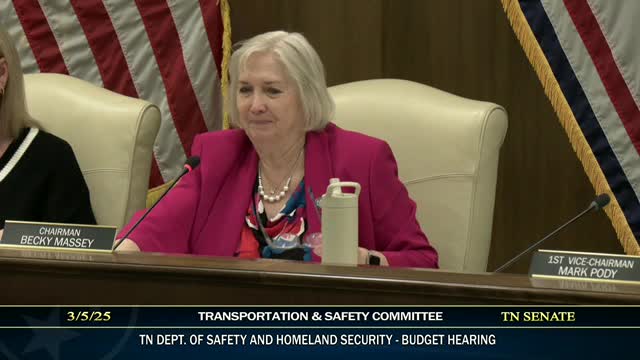Department of Safety presents budget increases for troopers, centers and radio system; committee approves budget with amendment
Get AI-powered insights, summaries, and transcripts
Subscribe
Summary
The Department of Safety presented a budget request that included recurring salary steps, new trooper positions, driver services expansion, maintenance for the statewide radio network, and equipment replacement for special operations. The Transportation and Safety Committee approved the budget and removed a house‑of‑worship grant line during the
The Tennessee Department of Safety presented its fiscal priorities and requested increases totaling roughly $56.2 million during a Transportation and Safety Committee hearing on Oct. 12. Committee members discussed funding for trooper positions, driver‑service centers, maintenance of a statewide radio network and equipment needs for special operations.
Key elements of the presentation: Commissioner Jeff Long and senior staff outlined twelve items that make up the department’s requested increase: statutory salary step raises; a regional pay survey adjustment; funding for 17 additional highway‑patrol positions; expansion of the school resource officer grant program; $5 million to cover alternative learning centers staffing; $1.25 million proposed previously for houses‑of‑worship security grants (subsequently removed on committee amendment); an estimated $113,800 for protected‑space costs; regional headquarters rent increases for four new facilities; a new driver‑service center in Sumner County (one supervisor and five examiners) estimated at $726,000; $1.5 million annual Motorola maintenance for the Tennessee Advanced Communications Network; replacement and upkeep of tracking‑system infrastructure; and $866,200 for replacement explosive‑ordinance robots for the Tennessee Highway Patrol’s special operations unit.
Radio system and timeline: Committee members asked about a carryforward balance of roughly $479 million that the department was using for radio‑system buildout. Department staff said the funds are tied to contracted tower construction and a multi‑year buildout of roughly 5–7 years to complete additional tower sites and associated infrastructure.
House‑of‑worship grant amendment: Senator Pote offered and the committee adopted an amendment to remove the house‑of‑worship grant funding from the Department of Safety budget and revert the money to the general fund. The clerk recorded the committee passage of the budget as 9 ayes after the amendment was adopted; the budget was advanced to the Senate finance committee.
Operational questions: Members asked about fleet replacement and driver‑service performance. The department said it maintains a vehicle for every trooper position (approximately 1,229 trooper positions) and that driver‑service wait times have improved from multi‑hour waits to an average in the low‑20‑minute range; the department plans an additional driver‑service center in a high‑demand area.
Ending: The committee advanced the department’s budget and asked for additional detail, including schedules for radio‑tower buildout and vehicle replacement counts, to be shared with members and finance staff.
